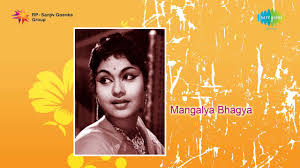“Mangalya Yoga,” a 1958 Kannada film directed by B. Ramakrishnaiah Panthulu, is a family drama that explores themes of love, sacrifice, and the cultural significance of marriage within traditional Indian society. The movie is renowned for its emotional depth, engaging narrative, and memorable performances, particularly by its lead actors.
The story revolves around two main characters: Ravi, a virtuous and hardworking young man, and Radha, a kind-hearted and beautiful young woman. Ravi, played by Kalyan Kumar, comes from a modest background but is determined to make a good life for himself and his family through hard work and integrity. Radha, portrayed by B. Saroja Devi, is the daughter of a wealthy landlord, yet she is humble and compassionate, admired by everyone in her village.
Ravi and Radha meet under serendipitous circumstances and develop a deep and genuine affection for each other. Their love blossoms despite the differences in their social status, highlighting the theme of true love transcending societal boundaries. However, their path to happiness is fraught with challenges.
Radha’s father, who has traditional views on marriage, disapproves of Ravi due to his lower social standing and modest means. He arranges for Radha to marry a wealthy but unscrupulous suitor. Radha, torn between her duty to her family and her love for Ravi, finds herself in a difficult predicament. The film delves into her internal struggle and the societal pressures that dictate her choices.
Ravi, on the other hand, is determined to prove his worth. He works tirelessly to improve his circumstances, not just for his love but also to gain the respect and approval of Radha’s family. His journey is marked by perseverance and moral fortitude, as he faces numerous obstacles and adversities.
The climax of the film brings a dramatic turn of events, where Radha’s father’s health deteriorates, leading him to realize the true worth of a good heart over wealth. This change of heart allows him to see Ravi’s genuine love and integrity. In a heartfelt resolution, he consents to Radha and Ravi’s union, blessing their marriage.
“Mangalya Yoga” is celebrated for its portrayal of the values of love, respect, and perseverance. The film’s narrative emphasizes that true happiness in marriage comes not from wealth and social status but from mutual respect, love, and understanding. The performances, particularly by Kalyan Kumar and B. Saroja Devi, add emotional depth to the story, making their characters relatable and their love story touching.
The film’s music, composed by R. Sudarsanam, plays a significant role in enhancing the emotional impact of the story. The songs and background score beautifully capture the essence of the characters’ emotions and the cultural setting of the narrative.
In summary, “Mangalya Yoga” is a poignant and heartwarming tale of love and marriage, underscoring the importance of personal virtues over material wealth. It remains a beloved classic in Kannada cinema, appreciated for its engaging storyline, strong performances, and cultural richness.


